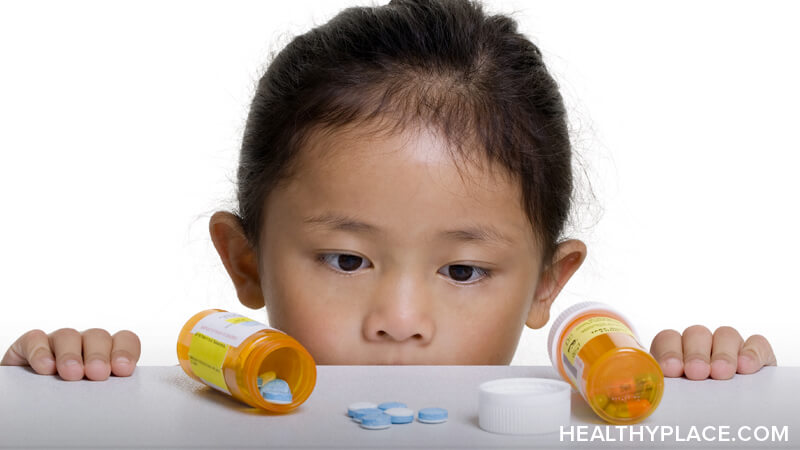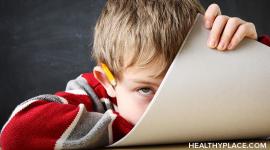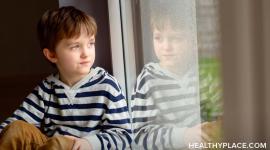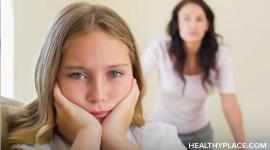How Do Bipolar Medications Affect Children?
 If your child has bipolar disorder, you likely wonder what childhood bipolar disorder medication will do to your child. This is a very understandable question but, unfortunately, it has a bit of a fuzzy answer. Due to the lack of study and simply the limitations of medicine, bipolar medications’ effects on children just isn’t completely understood. That said, we do know what to watch for in terms of side effects and therapeutic effects of medications in bipolar children.
If your child has bipolar disorder, you likely wonder what childhood bipolar disorder medication will do to your child. This is a very understandable question but, unfortunately, it has a bit of a fuzzy answer. Due to the lack of study and simply the limitations of medicine, bipolar medications’ effects on children just isn’t completely understood. That said, we do know what to watch for in terms of side effects and therapeutic effects of medications in bipolar children.
Should a Child Be Given Bipolar Medications?
Relatively few bipolar medications have been tested in children and the youngest age any testing has been done is 10 years old.
How Does Bipolar Medication Affect a Child’s Brain?
Unfortunately, this is the part of the story that we don’t understand. We know the basics of neurobiology of bipolar medication but all the effects are not known. When you give a child bipolar medication, you are altering his or her brain function and possibly structure in ways that fight the disease. These changes will alter various neurotransmitters depending on the type of medication. Common neurotransmitters that are altered include dopamine, serotonin and gamma-aminobutyric acid (GABA).
What Do Bipolar Medications Do to Treat Childhood Bipolar Disorder?
Of course, bipolar medication works to fight the symptoms of bipolar disorder in children. The way it does this varies depending on the medication. Common bipolar child medication types include:
- Mood stabilizers (lithium) – lithium is typically given in classic bipolar disorder that contains euphoric mania (elevated mood) or acute mania. This medication is known as good for long-term bipolar treatment as it’s known to stave off future episodes better than other medications and seems to have an antisuicide effect.
- Anticonvulsants – anticonvulsants are known to stabilize mood and some are more indicated for someone with more mania while others are indicated in those with more depression. For example, carbamazepine (Equetro) is more indicated for children with rapid-cycling bipolar disorder.
- Atypical antipsychotics (2nd generation antipsychotics) – these are often used to treat mania and induce mood stabilization. For example, quetiapine (Seroquel) is typically used to treat acute mania and mixed episodes and ziprasidone (Geodon) can also be used in this way but is also useful as a maintenance treatment.
The selection of medication for a child with bipolar will depend on the child’s specific symptoms and what he or she can tolerate. Also, more than one medication may be needed for full symptom control.
Bipolar Child Medication Side Effects
According to Medscape, the following are the more common bipolar child medications and their main side effects:
- Valproic acid (Depakote) – approved for children 12 years and older
- Sedation
- Platelet dysfunction
- Liver disease
- Alopecia (hair loss)
- Weight gain
- Lithium (Lithobid) – approved for children 12 years and older
- Gastrointestinal distress
- Lethargy
- Sedation
- Tremor
- Enuresis (inability to control urination)
- Weight gain
- Alopecia
- Cognitive blunting
- Aripiprazole (Abilify) – approved for children 12 years and older
- May cause prolactinemia (an excess of prolactin released into the bloodstream; a common and reversible cause of male infertility; less risk than risperidone)
- Stevens-Johnson syndrome
- Tardive dyskinesia (involuntary, repetitive body movements)
- Dystonia (sustained or repetitive muscle contractions result in twisting and repetitive movements or abnormal fixed postures)
- Parkinsonism (tremor, bradykinesia [slow movement], rigidity and postural instability)
- Hyperglycemia (high blood sugar)
- Carbamazepine (Equetro) – currently under study in a pediatric population
- Suppressed white blood cells
- Dizziness
- Drowsiness
- Rashes
- Liver toxicity (rare)
- Asenapine (Saphris) – approved for children 10 years and older
- Tiredness
- Oral paraesthesia (abnormal sensation)
- Risperidone (Risperdal) – approved for children 10 years and older
- Weight gain
- Sedation
- Orthostasis (low blood pressure)
- Quetiapine (Seroquel) – approved for children 10 years and older
- Sedation
- Orthostasis
- Weight gain
- Olanzapine (Zyprexa)
- Weight gain
- Dyslipidemia (an abnormal amount of lipids (e.g. triglycerides, cholesterol and/or fat phospholipids) in the blood)
- Sedation
- Orthostasis
- Ziprasidone (Geodon) – currently being used without specific pediatric approval
- Akathisia (a feeling of inner restlessness and a compelling need to be in constant motion)
- Nausea
Special Considerations for Bipolar Medication in Children
In addition to the above, according to Medscape, the following are special concerns to consider when treating a child with bipolar medication:
- Valproic acid
- Elevated liver enzymes or liver disease
- Drug interactions
- Bone marrow suppression
- Lithium
- Hypothyroidism
- Diabetes insipidus, toxic in dehydration, polyuria, polydipsia, renal disease; drug-drug interactions and sodium intake may alter therapeutic serum levels
- Aripiprazole
- Levels may need to be adjusted in patients who are concurrently receiving lamotrigine, topiramate, valproic acid, lithium or other serotonin-norepinephrine reuptake, selective serotonin reuptake, or cytochrome P450 inhibitors
- Not to be used if there is an unstable seizure disorder
- Carbamazepine
- Drug interactions
- Bone marrow suppression
- Asenapine
- Pediatric patients are more sensitive to dystonia with initial dosing when recommended escalation schedule not followed
- Risperidone
- Galactorrhea (milky nipple discharge)
- Extrapyramidal symptoms (physical symptoms, including tremor, slurred speech, akathisia, dystonia, anxiety, distress, paranoia and bradyphrenia [slowness of thought])
- Quetiapine
- Dose should be decreased with hepatic impairment
- May cause neuroleptic malignant syndrome (a life-threatening reaction characterized by fever, altered mental status, muscle rigidity and autonomic dysfunction or hyperglycemia [high blood glucose])
- Olanzapine
- Metabolic syndrome (complications of obesity including abdominal obesity, raised triglycerides, reduced HDL, elevated blood pressure and raised plasma glucose)
- Extrapyramidal symptoms
- Ziprasidone
- Risk of sudden cardiac death due to torsades des pointes (uncommon variant of ventricular tachycardia [very fast heart rhythm]) due to prolonged QT prolongation, which makes this medication undesirable for individuals with a family history of cardiac sudden death related to cardiac conduction abnormalities
It should be noted that other side effects are also possible and any concerns should be discussed with the prescribing doctor as soon as possible.
When Considering Bipolar Medication for Children
While many of the side effects of bipolar medication for children can seem frightening and some are even life-threatening, it’s important to understand the risk vs. reward scenario for any individual child. Many of these side effects are extremely rare and a doctor can assess a child’s specific risk with regards to any medication.
APA Reference
Tracy, N.
(2021, December 28). How Do Bipolar Medications Affect Children?, HealthyPlace. Retrieved
on 2026, January 12 from https://www.healthyplace.com/bipolar-disorder/bipolar-children/how-bipolar-medications-affect-children


